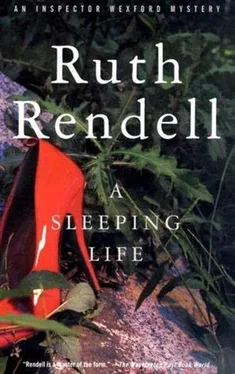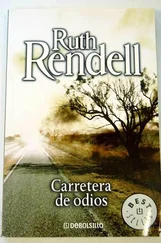Ruth Rendell - A Sleeping Life
Здесь есть возможность читать онлайн «Ruth Rendell - A Sleeping Life» весь текст электронной книги совершенно бесплатно (целиком полную версию без сокращений). В некоторых случаях можно слушать аудио, скачать через торрент в формате fb2 и присутствует краткое содержание. Жанр: Детектив, на английском языке. Описание произведения, (предисловие) а так же отзывы посетителей доступны на портале библиотеки ЛибКат.
- Название:A Sleeping Life
- Автор:
- Жанр:
- Год:неизвестен
- ISBN:нет данных
- Рейтинг книги:3 / 5. Голосов: 1
-
Избранное:Добавить в избранное
- Отзывы:
-
Ваша оценка:
- 60
- 1
- 2
- 3
- 4
- 5
A Sleeping Life: краткое содержание, описание и аннотация
Предлагаем к чтению аннотацию, описание, краткое содержание или предисловие (зависит от того, что написал сам автор книги «A Sleeping Life»). Если вы не нашли необходимую информацию о книге — напишите в комментариях, мы постараемся отыскать её.
A Sleeping Life — читать онлайн бесплатно полную книгу (весь текст) целиком
Ниже представлен текст книги, разбитый по страницам. Система сохранения места последней прочитанной страницы, позволяет с удобством читать онлайн бесплатно книгу «A Sleeping Life», без необходимости каждый раз заново искать на чём Вы остановились. Поставьте закладку, и сможете в любой момент перейти на страницу, на которой закончили чтение.
Интервал:
Закладка:
He read from a card: ' “Rhoda Agnes Comfrey. Age fortynine. No history of disease, apart from usual childhood ailments. No surgery. Smoker – “ I told her to give that up, by the way. “Social drinker “ That can mean anything. “Formerly registered with Dr Castle of Glebe Road, Kingsmarkham, Sussex.” ‘
‘And he died last year,’ said Wexford. ‘You’ve been a great help, Doctor. Can I trouble you to tell a stranger in these parts where Princevale Road might be?’
‘Half way down that hill you came up from the station. It turns off on the same side as this just above the block of shops.’
Wexford and Burden walked slowly back to the avenue which they now noted was called Montfort Hill. ‘Funny, isn’t it?’ said Wexford. ‘We know everyone else must have known her under an assumed name, but not her doctor, I wonder why not.’
‘Too risky?’
‘What’s the risk? In English law one can call oneself what one likes. What you call yourself is your name. People think you have to change your name by deed poll but you don’t. I could call myself Waterford tomorrow and you could call yourself Fardel without infringing a hairsbreadth of the law.’
Looking puzzled, Burden said, ‘I suppose so. Look, I see the Waterford thing, but why Fardel?’
‘You grunt and sweat under a weary life, don’t you? Never mind, forget it. We won’t go to Princevale Road immediately. First I want to introduce you to some friends of mine.’
Baker seemed to have forgotten his cause for offence and greeted Wexford cordially. ‘Michael Baker, meet Mike Burden, and this, Mike, is Sergeant Clements.’
Once, though not for more than a few hours, Wexford had suspected the rubicund baby-faced sergeant of murder to be certain of the undisputed guardianship of his adopted son. It always made him feel a little guilty to remember that, even though that suspicion had never been spoken aloud. But the memory – how could he have entertained such ideas about this pillar of integrity? – had made him careful, in every subsequent conversation, to show kindness to Clements and not fail to ask after young James and the small sister chosen for him. However, the sergeant was too conscious of his subordinate rank to raise domestic matters now, and Wexford was glad of it for other reasons. He, in turn, would have been asked for an account of his grandsons, at present a sore and embarrassing subject.
'Trincevale Road?’ said Baker. ‘Very pleasant district. Unless I’m much mistaken, number six is one of a block of what they call town houses, modern sort of places with a lot of glass and weatherboarding.’
‘Excuse me, sir,’ Clements said eagerly, ‘but unless I’m much mistaken we were called to break-in down there a few months back. I’ll nip downstairs and do a bit of checking.’
Baker seemed pleased to have guests and something to relieve the tedium of August in Kenbourne Vale. ‘How about a spot of lunch at the Grand Duke, Reg? And then we could all get along there, if you’ve no objection?’
Anxious to do nothing which might upset the prickly Baker, who was a man of whom it might be said that one should not touch his ears, Wexford said that he and Burden would be most gratified, adding to Baker’s evident satisfaction, that he didn’t know how they would get on without his help. The sergeant came back, puffed up with news.
‘The occupant is a Mrs Farriner,’ he said. ‘She’s away on holiday. It wasn’t her place that was broken into, it was next door but one, but apparently she’s got a lot of valuable stuff and she came in here before she went away last Saturday week to ask us to keep an eye on the house for her.’
‘Should put it on safe deposit,’ Baker began to grumble. ‘What’s the use of getting us to…’
Wexford interrupted him. He couldn’t help himself. ‘How old is she, Sergeant? What does she look like?’
‘I’ve not seen her myself, sir. Middle-aged, I believe, and a widow or maybe divorced. Dinehart knows her.’
‘Then get Dinehart to look at that photo, will you?’
‘You don’t mean you think Mrs Farriner could be that Comfrey woman, sir?’
‘Why not?’ said Wexford.
But Dinehart was unable to say one way or another. Certainly Mrs Farriner was a big tall woman with dark hair who lived alone. As to her looking like that girl in the picture – well, people change a lot in twenty years. He wouldn’t like to commit himself. Wexford was tense with excitement. Why hadn’t he thought of that before? All the time he was frustrated or crossed by people being away on holiday, and yet he had never considered that Rhoda Comfrey might not have been missed by friends and neighbours because they expected her to be absent from her home. They supposed a Mrs Farriner to be at some resort, going under the name by which they knew her, so why connect her with a Miss Comfrey who had been found murdered in a Sussex town?
In the Grand Duke, an old-fashioned pub that had surely once been a country inn, they served themselves from the cold table. Wexford felt too keyed-up to eat much. Dealing diplomatically with people like Baker might be a social obligation, but it involved wasting a great deal of time. The others seemed to be taking what he saw as a major breakthrough far more placidly than he could. Even Burden showed a marked lack of enthusiasm.
‘Doesn’t it strike you as odd,’ he said, ‘that a woman like this Mrs Farriner, well-off enough to live where she lives and have all that valuable stuff, should keep a wallet she presumably found on a bus?’
‘There’s nowt so strange as folk,’ said Wexford.
‘Maybe, but it was you told me that any departure from the norm is important. I can imagine the Rhoda Comfrey we know doing it, but not this Mrs Farriner from what we know of her. Therefore it seems unlikely to me that they’re one and the same.’
‘Well, we’re not going to find out by sitting here feeding our faces,’ said Wexford crossly.
To his astonishment, Baker agreed with him. ‘You’re quite right. Drink up, then, and we’ll get going.’
Ascending Montfort Hill on the bus, Wexford hadn’t noticed the little row of five or six shops on the left-hand side. This time, in the car, his attention was only drawn to them by the fact of Burden giving them such an intense scrutiny. But he said nothing. At the moment he felt rather riled with Burden. The name of the street which turned off immediately beyond these shops was lettered in black on a white board, Princevale Road, W19, and Burden eyed this with similar interest, craning his neck to look back when they had passed it. At the very end of the street – or perhaps, from the numbering, the very beginning – stood a row of six terraced houses. They looked less than ten years old and differed completely in style from the detached mock-Tudor, each with a generous front garden, that characterized Princevale Road.
Wexford supposed that they had been built on ground left vacant after the demolition of some isolated old house. They were a sign of the times, of scarcity of land and builders’ greed. But they were handsome enough for all that, three floors high, boarded in red cedar between the wide plateglass windows. Each had its own garage, integrated and occupying part of the ground floor, each having a different coloured front door, orange, olive, blue, chocolate, yellow and lime. Number six, at this end of the block, had the typical invitation-to-burglars look a house takes on when its affluent and prideful owner is away. All the windows were shut, all the curtains drawn back with perfect symmetry. An empty milk bottle rack stood on the doorstep, and there were no bottles, full or empty, beside it. Stuck through the letterbox and protruding from it were a fistful of letters and circulars in brown envelopes. So much for police surveillance, Wexford thought to himself.
Читать дальшеИнтервал:
Закладка:
Похожие книги на «A Sleeping Life»
Представляем Вашему вниманию похожие книги на «A Sleeping Life» списком для выбора. Мы отобрали схожую по названию и смыслу литературу в надежде предоставить читателям больше вариантов отыскать новые, интересные, ещё непрочитанные произведения.
Обсуждение, отзывы о книге «A Sleeping Life» и просто собственные мнения читателей. Оставьте ваши комментарии, напишите, что Вы думаете о произведении, его смысле или главных героях. Укажите что конкретно понравилось, а что нет, и почему Вы так считаете.











